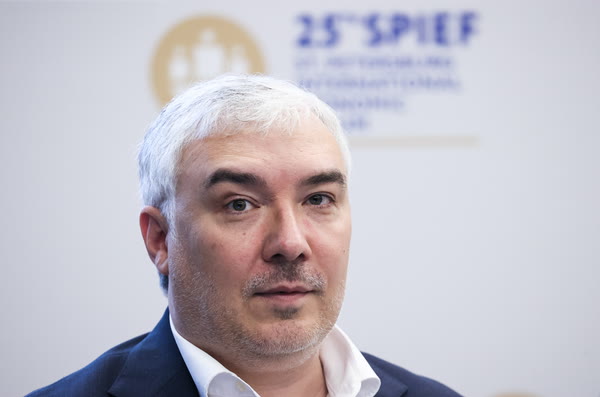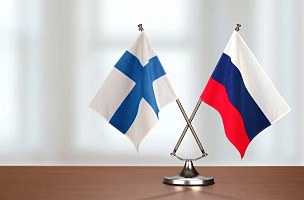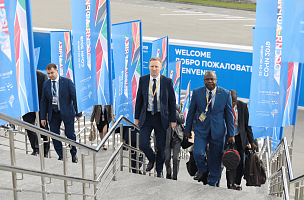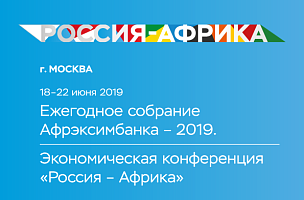Key conclusions
«The last few years we have been saying these words like a spell: sustainable development, the climate agenda, ESG, the energy transition, and on and on and on. By mixing it up, we are fooling ourselves. These are things that are connected to each other in a completely artificial way. <...> It is necessary to break this connection. Break the link between climate change, for example, and the ESG agenda. Combining E, S and G is profoundly artificial and serves purposes that are definitely not in Russia’s national interests at the moment,» Dmitry Peskov, Head of Young Professionals Direction, Agency of Strategic Initiatives; General Director, Platform of the National Technology Initiative; Special Representative of the President of the Russian Federation on Digital and Technological Development.
«The climate is changing. We somehow have to adapt to it, and that is a very serious challenge. We are growing more and more dependent on hi-tech solutions, new technologies, and they are all extremely vulnerable in terms of physical impact. Accordingly, we have to adapt from the technological point of view. We have to be prepared to adapt to the social challenges that are growing — same way as the world’s population is growing, inequality of its distribution grows, just as the income of that population does. These tasks are solved quite differently in different countries, but nevertheless, as these are common tasks. They converge somewhere and the ESG system is what connects them. It allows us to find common ground, to exchange practices, to equalize or not to equalize conditions in solving common problems,» Tatiana Zavyalova, Senior Vice President for ESG, Sberbank.
«The context of corporate governance within a company is changing significantly. The composition of boards of directors is changing, and often those board-level ambassadors have been forced to leave Russian companies. At this point, it is extremely important to form the community of new sustainable development ambassadors,» Elena Dubovitskaya, Director of Centre for Sustainable Development SKOLKOVO Moscow School of Management.
Russia requires its own climate adaptation system
«The climate agenda is the most important challenge facing humanity in the 21st century. It must be taken seriously! We have to stop fooling ourselves: the goals of carbon neutrality are absolutely unattainable, the leading players have already abandoned them. <...> The ESG agenda for Russia as a whole is a completely alien concept. It has been imposed and artificially modelled for us. We need to develop our own national system of climate adaptation, which does not tinker with someone else’s models, but instead helps achieve national and global objectives of climate adaptation in the 21st century,» Dmitry Peskov, Head of Young Professionals Direction, Agency of Strategic Initiatives; General Director, Platform of the National Technology Initiative; Special Representative of the President of the Russian Federation on Digital and Technological Development.
PROBLEMS
«Climate change and global warming — these are basic development paths for this planet. They have not been artificially invented by anyone. It is an authentic change that is really happening. It is really a global challenge for the whole planet. We must react to it. <...> In English-language expert literature these are two terms for it: Mitigation and Adaptation,» Dmitry Peskov, Head of Young Professionals Direction, Agency of Strategic Initiatives; General Director, Platform of the National Technology Initiative; Special Representative of the President of the Russian Federation on Digital and Technological Development.
«I mean, of course, we primarily look at ourselves, at Russia. But we have just arrived to the conclusion that this is not an isolated task for an isolated country. First, we need to understand what is happening with ESG around the world. And there is a significant transformation of understanding of these things in the world because of various challenges: climatic, technological and economic. <...> Moody’s forecast, for example, has already been downgraded by 25% this year in terms of growth in ESG bonds globally,» Tatiana Zavyalova, Senior Vice President for ESG, Sberbank.
«The education agenda is also being transformed quite substantially. We can see that the drivers that shaped and developed the agenda yesterday have changed dramatically. Foreign teachers often can not teach anymore, and international cases have become impossible to use. <...> Of course, any business school, any educational institution is energetically reviewing its educational programmes,» Elena Dubovitskaya, Director of Centre for Sustainable Development SKOLKOVO Moscow School of Management.
«A very important point that shapes many of our problems is unfortunately based on our export structure. Most companies perceive any green initiatives <...> as a burden, not as an environmental advantage,» Evgeny Shvarts, Head, Centre for Responsible Nature Management of the Institute of Geography of the Russian Academy of Sciences; Doctor of Geographical Sciences, Distinguished Ecologist of the Russian Federation.
«One of the main problems is that we do not have shared values, there’s no dialogue. It is extremely important that we do not simply propose instruments to each other. Weather we aim for development or rejection thereof, we must really understand <...> what task we are resolving and what are we trying to achieve,» Evgeny Shvarts Head, Centre for Responsible Nature Management of the Institute of Geography of the Russian Academy of Sciences; Doctor of Geographical Sciences, Distinguished Ecologist of the Russian Federation.
ESG Transformation Can Be Observed Around the Globe
«The transformation of ESG is not simply about the pace of attracting financial resources. It is also about the revision of what is ESG: what we include in this term, how do we appraise it, how does the world used to evaluate ESG projects, and whether they correspond to current evaluations. Accordingly, the transformation of ESG is now being seen in the world as a whole. This applies to Russia to a greater extent, because we are in a state of restructuring of our economy,» Tatiana Zavyalova, Senior Vice President for ESG, Sberbank.
«Now, we do not have access to international markets and investors anymore. Same can be said about the positions in international ratings, which drove large corporations and banks to promote themselves and improve their rankings — this is also gone. But let us see what remains: the real climate change, our involvement in the international trading system through our new partners with whom we are now vigorously building relationships <...> The countries of the Asia-Pacific region are already very well structured in terms of ESG, primarily Asian countries,» Tatiana Zavyalova Senior Vice President for ESG, Sberbank.
SOLUTIONS
«Our main goal, national and global at the same time, is not mitigation, but adaptation. And the right strategy for Russia is a strategy of climate adaptation to the changes that will now inevitably happen. Those include improving the sustainability of agriculture, ensuring migration flows, creating a technological package for autonomous existence in certain areas, a new generation of drugs that fight infections, and so on and so forth. This is a genuine sustainable development agenda,» Dmitry Peskov, Head of Young Professionals Direction, Agency of Strategic Initiatives; General Director, Platform of the National Technology Initiative; Special Representative of the President of the Russian Federation on Digital and Technological Development.
«For sustainable development, we must do everything to develop the domestic market, to make ourselves sustainable. We are developing everything, but not the domestic market. We have 140 million people. We lost the CMEA, we lost the CIS, we are losing them still <...> we have a number of great programmes in the Ministry of Industry and Trade, we have a great IDP programme, but can we simplify all these systems?» Mikhail Sutyaginskiy, Chairman of the Board of Directors, Titan Group of Companies.
«We took the best in sustainable development. <...> We work with both the climate agenda and biodiversity. <...> If we (INK-Capital — ed.) as a small company can do everything in our power to minimize the impact on the climate... If my colleagues from other companies, at least Russian ones, support zero-carbon footprint, we will already have done a lot. Today we are setting our own sustainable development goals, implementing our own methodology for managing these goals, creating a climate agenda as we see it. We are creating our own sustainable development strategy,» Marina Sedykh, CEO, INK-Capital.
«ESG professionals often encounter scepticism about their agenda from management or boards of directors. In terms of persuasive communication, educational institutions and business schools can seriously help promote and develop this agenda within the company,» Elena Dubovitskaya, Director of Centre for Sustainable Development SKOLKOVO Moscow School of Management.
«Before environment-conscious positions are viewed as a competitive advantage we are not going to get far,» Evgeny Shvarts, Head, Centre for Responsible Nature Management of the Institute of Geography of the Russian Academy of Sciences; Doctor of Geographical Sciences, Distinguished Ecologist of the Russian Federation.
«Sustainability of one company does not exist. These are all small carvings of a larger success. A territory can develop, and it can be sustainable, but you have to create certain specializations for this to happen <...> As it is done by certain provinces, for instance, in China,» Mikhail Sutyaginskiy, Chairman of the Board of Directors, Titan Group of Companies.
«Today, I think any manufacturer would be happy to trade their technology for a new one. The main thing is that there is access to resources. But to this end, regional authorities must recalibrate their KPIs in order to be able to either create or take advantage of the natural benefits that exist in the region, or at least restore the specialization that existed before the collapse of the Soviet Union,» Mikhail Sutyaginskiy, Chairman of the Board of Directors, Titan Group of Companies.
Sustainable development agenda is both local and global at the same time
«The key to survival is diversity. No system that is based only on one standard, one group, or one position can be sustainable. The pandemic has shown this very well <...> it would be better for the planet and for the world, for civilization, for sustainable development if there were several different national and multinational systems. Within these systems different approaches to climate adaptation are developed, tried, tested, and the most sustainable models are then reproduced around the world,» Dmitry Peskov, Head of Young Professionals Direction, Agency of Strategic Initiatives; General Director, Platform of the National Technology Initiative; Special Representative of the President of the Russian Federation on Digital and Technological Development.
«For us (Sber — ed.) both letter E and S matter very much. We pay a lot of attention to this. Just like all the other companies, we have revised and adapted our plans, but in general we expect that our plans to implement the ESG-strategy will not be much affected. We will stick to our goal to achieve carbon neutrality by year 2030,» Tatiana Zavyalova, Senior Vice President for ESG, Sberbank.
«In my opinion, there is no end of globalization. A shift from the dominance of the dollar to a dozen powerful regional currencies — nobody will argue that it is a good thing,» Evgeny Shvarts, Head, Centre for Responsible Nature Management of the Institute of Geography of the Russian Academy of Sciences; Doctor of Geographical Sciences, Distinguished Ecologist of the Russian Federation.
«If we do not like the way the decisions are made — let us use global standards but let us change auditors and verifiers,» Evgeny Shvarts, Head, Centre for Responsible Nature Management of the Institute of Geography of the Russian Academy of Sciences; Doctor of Geographical Sciences, Distinguished Ecologist of the Russian Federation.






